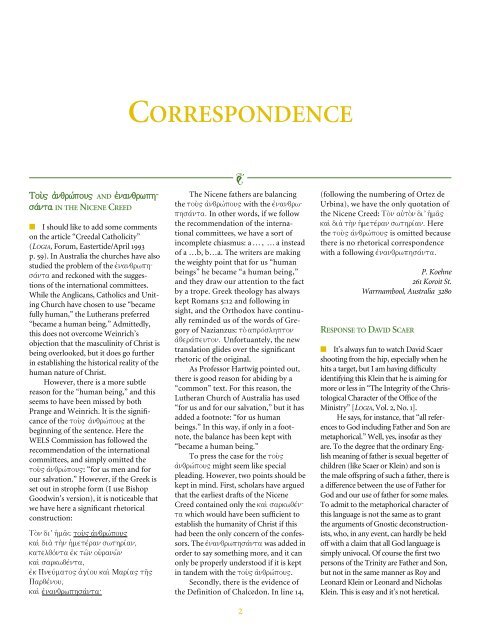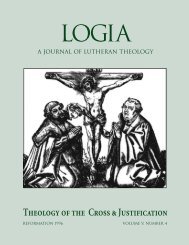03-1 Pastoral Care.pdf
03-1 Pastoral Care.pdf
03-1 Pastoral Care.pdf
- No tags were found...
Create successful ePaper yourself
Turn your PDF publications into a flip-book with our unique Google optimized e-Paper software.
CORRESPONDENCETou;" ajnqrwvpou" AND ejnanqrwphsavntaIN THE NICENE CREED■ I should like to add some commentson the article “Creedal Catholicity”(LOGIA, Forum, Eastertide/April 1993p. 59). In Australia the churches have alsostudied the problem of the ejnanqrwphsavntaand reckoned with the suggestionsof the international committees.While the Anglicans, Catholics and UnitingChurch have chosen to use “becamefully human,” the Lutherans preferred“became a human being.” Admittedly,this does not overcome Weinrich’sobjection that the masculinity of Christ isbeing overlooked, but it does go furtherin establishing the historical reality of thehuman nature of Christ.However, there is a more subtlereason for the “human being,” and thisseems to have been missed by bothPrange and Weinrich. It is the significanceof the tou;" ajnqrwvpou" at thebeginning of the sentence. Here theWELS Commission has followed therecommendation of the internationalcommittees, and simply omitted thetou;" ajnqrwvpou": “for us men and forour salvation.” However, if the Greek isset out in strophe form (I use BishopGoodwin’s version), it is noticeable thatwe have here a significant rhetoricalconstruction:To;n di∆ hJma'ı tou;" ajnqrwvpou"kai; dia; th;n hJmetevran swthrivan,katelqovnta ejk tw'n oujranw'nkai; sarkwqevnta,ejk Pneuvmato" aJgivou kai; Mariva" th'"Parqevnou,kai; ejnanqrwphsavnta:The Nicene fathers are balancingthe tou;" ajnqrwvpou" with the ejnanqrwphsavnta.In other words, if we followthe recommendation of the internationalcommittees, we have a sort ofincomplete chiasmus: a … , … a insteadof a …b, b…a. The writers are makingthe weighty point that for us “humanbeings” he became “a human being,”and they draw our attention to the factby a trope. Greek theology has alwayskept Romans 5:12 and following insight, and the Orthodox have continuallyreminded us of the words of Gregoryof Nazianzus: to; aprovslhptonajqeravpeuton. Unfortuantely, the newtranslation glides over the significantrhetoric of the original.As Professor Hartwig pointed out,there is good reason for abiding by a“common” text. For this reason, theLutheran Church of Australia has used“for us and for our salvation,” but it hasadded a footnote: “for us humanbeings.” In this way, if only in a footnote,the balance has been kept with“became a human being.”To press the case for the tou;"ajnqrwvpou" might seem like specialpleading. However, two points should bekept in mind. First, scholars have arguedthat the earliest drafts of the NiceneCreed contained only the kai; sarkwqevntawhich would have been sufficient toestablish the humanity of Christ if thishad been the only concern of the confessors.The ejnanqrwphsavnta was added inorder to say something more, and it canonly be properly understood if it is keptin tandem with the tou;" ajnqrwvpou".Secondly, there is the evidence ofthe Definition of Chalcedon. In line 14,2(following the numbering of Ortez deUrbina), we have the only quotation ofthe Nicene Creed: To;n aujto;n di∆ hJma'"kai; dia; th;n hJmetevranswthrivan. Herethe tou;" ajnqrwvpou" is omitted becausethere is no rhetorical correspondencewith a following ejnanqrwphsavnta.P. Koehne261 Koroit St.Warrnambool, Australia 3280RESPONSE TO DAVID SCAER■ It’s always fun to watch David Scaershooting from the hip, especially when hehits a target, but I am having difficultyidentifying this Klein that he is aiming formore or less in “The Integrity of the ChristologicalCharacter of the Office of theMinistry” [LOGIA, Vol. 2, No. 1].He says, for instance, that “all referencesto God including Father and Son aremetaphorical.” Well, yes, insofar as theyare. To the degree that the ordinary Englishmeaning of father is sexual begetter ofchildren (like Scaer or Klein) and son isthe male offspring of such a father, there isa difference between the use of Father forGod and our use of father for some males.To admit to the metaphorical character ofthis language is not the same as to grantthe arguments of Gnostic deconstructionists,who, in any event, can hardly be heldoff with a claim that all God language issimply univocal. Of course the first twopersons of the Trinity are Father and Son,but not in the same manner as Roy andLeonard Klein or Leonard and NicholasKlein. This is easy and it’s not heretical.
















